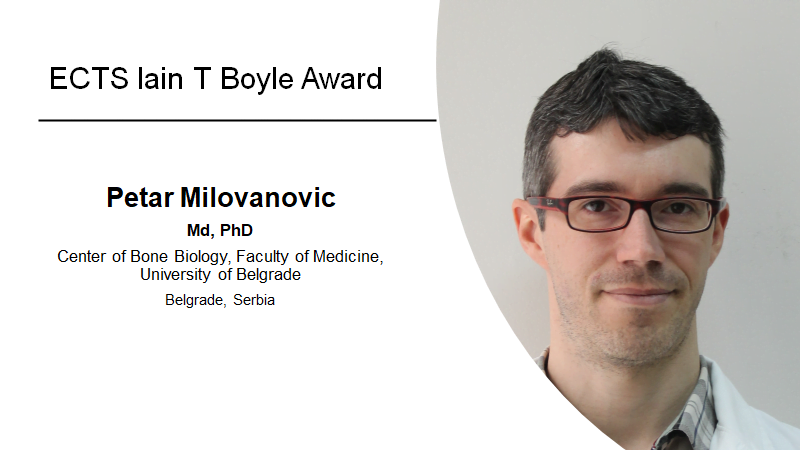ECTS Iain T Boyle Award
Nominations period: nominations are now open till 17th December 2023
In memory of Professor Iain T Boyle (1935–2001) who contributed greatly to the field of mineral metabolism and his work on osteoporosis was known and acclaimed nationally and internationally. The award is open to young scientists who have made significant progress and contribution to the field of bone and calcified tissue.
The award is for €1000 (Euros) is announced during the ECTS annual congress.
The awardee will be invited to actively contribute to ECTS either during the congress or within one of the committees.
Eligibility
This award is open to young scientists who have made significant progress and contribution to the field of bone and calcified tissue. The nominee should be within 10 years of completing their PhD (or equivalent).
ECTS Board members are not eligible to this award during term of office in the ECTS Board.
Submission Procedure
Nominations for the 2023 Iain T Boyle Award are now open till 17th December 2023.
Nominees must be nominated and seconded by ECTS members and must be submitted via the online form.
Review Procedure
All nominations are reviewed by an independent panel of reviewers. The final decision is based on the marks and comments from the reviewers and any conflicts of interest are identified and dealt with appropriately.
Winner of the 2023 Award
Congratulations to Dr. Petar Milovanovic, M.D., Ph.D.,Center of Bone Biology, Faculty of Medicine, University of Belgrade, Serbia recipient of the 2023 Iain T Boyle Award presented during the ECTS 2023 Congress in Liverpool.
For a full list of previous Award recipients, please visit the Previous Grants section.
Petar Milovanovic graduated from the Faculty of Medicine, University of Belgrade in 2009 as the Best Graduate, and obtained his PhD degree from the University of Belgrade in 2014 with summa cum laude for the thesis focusing on nano- and micro-structural evaluation of bone tissue to reveal the origins of bone fragility in elderly women. His research focuses on various aspects of bone structure and their relevance for maintenance or degradation of bone strength. Petar has worked especially on the distribution and viability of osteocytes in health and in various conditions with bone fragility. In particular, he contributed to the quantification and ultrastructural/compositional evaluation of micropetrosis (mineralization of osteocyte lacunae), showing that the conditions with various levels of bone fragility can be correlated to the prevalence of mineralized osteocyte lacunae. Another important contribution of his work is related to the microstructural and compositional origins of bone fragility at the femoral neck in type 2 diabetes mellitus. His scientific achievements stimulated research of bone fragility, and positioned him as the recognized young leader of bone research activities in Serbia.
Dr. Milovanovic is a very much appreciated and approachable member of the ECTS community. He has attended ECTS congresses for years. Since 2018, as a member of the ECTS Academy, he has been involved in the work of several committees for education, mentoring, and promotion of European bone research among young researchers. In January 2020, he joined the ECTS Newsletter action group at the time when I was the Editor-in-Chief of the Newsletter. Since January 2021, he is working as the Editor-in-Chief of the ECTS Newsletter. He is also actively engaged in the ECTS Central Europe action group since 2020, and contributes to the promotion of ECTS activities in countries with less well-organized bone research network.
